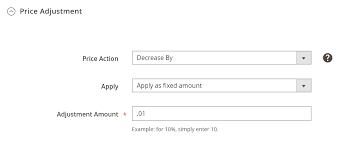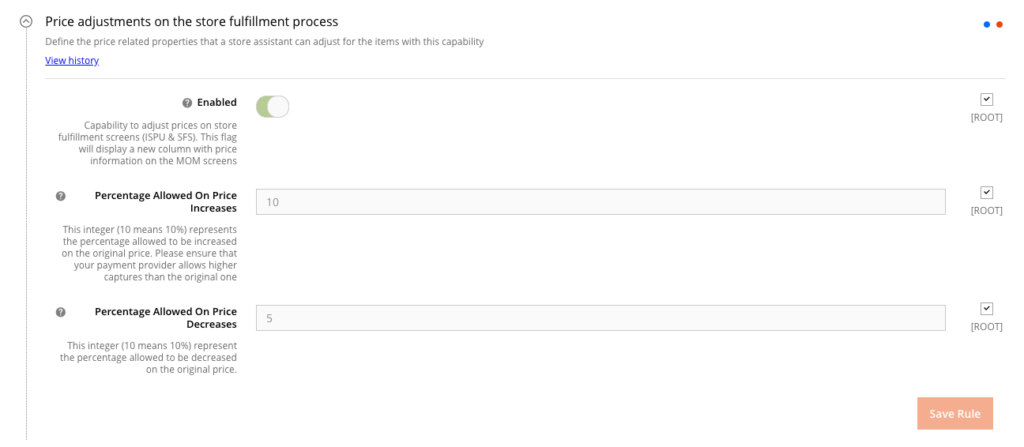
Most major brick and mortar retail chains offer price adjustments as a way to retain customers. When a customer purchases a product and the price of that product decreases within a certain amount of time after purchase (usually two weeks or a month), the customer can request a refund of the difference between the purchase price and the new price. Unlike price match guarantees, price adjustments only take into account the prices of a product at a single store.
Without price adjustments, customers oftentimes feel like they’ve been scammed if the price of a major item drops significantly immediately after purchase. Price adjustments are an effective way for retailers to increase customer satisfaction and loyalty without spending an excessive amount. Therefore, it’s significant to consider adopting a tool for price adjustments when you want to start any eCommerce business these days.
With the Magento 2 order management system (OMS), price adjustments are easy to perform and easy to configure. In this article, the process for performing a price adjustment is discussed, along with an explanation of how price adjustments can be modified in the Magento system integrator portal.
Table of Contents
When Can Price Adjustments Be Used?
The Magento 2 OMS allows store associates to adjust the price for specific items when picking an order. Prices can be adjusted either for a single order or at a catalog-wide level. Magento users can only use the price adjustment functionality for the Ship From Store and In Store Pick Up Omnichannel fulfillment processes, meaning that some fulfillment processes are incompatible with price adjustments.
An additional feature for Ship From Store processes is the ability to change the price of a line item after picking is complete. This is the most frequently used feature for implementing price adjustments the same way as traditional brick and mortar retail store chains.

For integration with third-party dashboards and other functionality, the Magento OMS also includes the magento.logistics.fulfillment_management.adjust_line_price API call, which can be programmatically triggered. In the vast majority of cases, price adjustments are performed through the standard OMS interface, not the Magento API.
How Are Price Adjustments Used?
When picking an order, line items are adjustable with the pencil icon, displayed next to the price. Store associates can click this button and enter a different price that is within the range specified by the system integrator in the SI portal. This method for performing price adjustments can be used for both the Ship From Store and In Store Pick Up processes at the time of picking.

The second method for performing price adjustments only works for Ship From Store orders, but it can be performed after picking is complete. Visit the Customer Service/Orders section of the dashboard, then verify that all the information displayed for the order is correct. Prices will be adjustable at this time. Additionally, both order and individual items can be cancelled and appeasements can be created. If a price adjustment or item cancellation is made, a refund will be automatically created and available for viewing at the Sales/Orders section of the Magento OMS dashboard.
What Areas Do Price Adjustments Affect?
Price adjustments made by a store associate can affect either the items in that individual order or the entire catalog. Catalog-level price adjustments affect an item in future orders, while order-level price adjustments affect specifically selected current orders. In the case of Ship From Store orders where the price adjustment is applied after the order has been picked, only the price of the item in that particular order will be affected.
How Can System Integrators Restrict Price Adjustments?
Although allowing store associates to adjust prices directly while picking orders can save significant amounts of time, this functionality may be dangerous to grant without imposing some level of restriction. Expensive items could accidentally (or maliciously) be made completely free; inexpensive items could be adjusted to extreme prices. For this reason, Magneto allows system integrators to set percentage-based limits on price adjustments using the SI portal. If a store associate enters a price out of the defined threshold, an error message will be displayed.
First, verify that price adjustments are enabled in the “Price adjustments on the store fulfillment process” definition in the system integrator portal. Regardless of the state of any other settings, this toggle must be enabled for the price adjustment functionality to work at all.
Next, define the “Percentage Allowed On Price Increases” and “Percentage Allowed On Price Decreases” settings. In the case of price increases, it is important to verify that the payment provider used in the Magento system is equipped to handle a higher capture made after the initial payment authorization. As mentioned in the description in the SI portal interface, these options are specified as an integer percentage of the original or canonical price.
Finally, save the rule, selecting both the Manage Ship From Store orders and Manage In Store Pick Up (ISPU) Orders permissions.
Price adjustments are an exceedingly useful tool in retail. They allow stores to retain satisfied customers, maintain their reputation, and improve loyalty all without spending significant sums of customer support time or money. In both traditional retail and ecommerce storefronts utilizing the Magento 2 order management system, price adjustment functionality is available to allow store associates to change item prices within defined thresholds during order picking in Ship From Store and In Store Pick Up orders. In the case of Ship From Store orders, item prices can also be changed after picking has been completed. Magento system integrators can adjust thresholds for price adjustments, preventing extremely large price changes from being authorized.
Elogic’s Magento integration services help businesses integrate Magento-based ecommerce stores with third-party software and ERP/CRM systems. For eCommerce businesses of all kinds, Elogic can help integrate external payment systems, enterprise accounting software, inventory management systems, fulfillment software, and more with Magento 2 ecommerce storefronts. Elogic knows how to start an ecommerce business and proved it by creating over 70 ecommerce websites in ten years of experience. As a certified Magento Solutions Partner, customers can be certain that Elogic will craft the perfect ecommerce solution for businesses of any kind.
Other Useful Guides
- 5 Easy Tips To Optimize Performance of Your Magento Ecommerce Store
- How to Create Direct Several Online Stores Using Magento CMS
- How to build a website in 5 simple steps?
- How to Migrate Magento 2 Successfully and Without Mistakes
- How To Use Popups? Less Annoying & More Effective Guide!
- Magento 2: How to Install New Language Packs
- How to Create a Successful eCommerce Store from Scratch











![[SALE OFF] Discount 30% All Premium Extensions On Christmas And New Year 2025 christmas-and-new-year-2025](https://landofcoder.b-cdn.net/wp-content/uploads/2024/12/christmas-and-new-year-2025-1-218x150.png)






